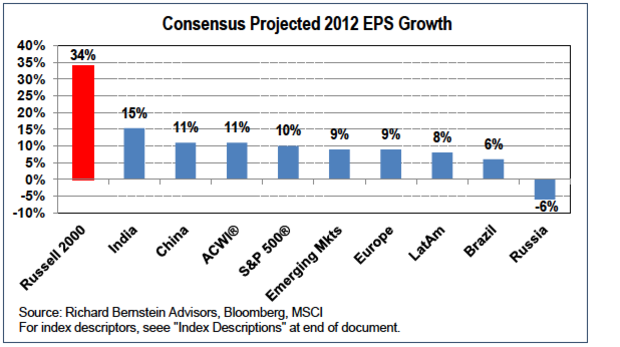The best investment of 2012?
Investment strategists are trotting out their 2012 outlooks, and one common recommendation is to favor big companies with solid balance sheets and strong credit ratings -- preferably ones that pay dividends.
It's a perfectly credible call, especially in a high-risk, low-interest-rate world where even the debt of the U.S. government and major European powers is subject to downgrade.
All of which makes Richard Bernstein's case for small-cap stocks sound rather counterintuitive -- if not downright daring. But the well-regarded CEO of Richard Bernstein Advisors (and former chief investment strategist at Merrill Lynch), says U.S. small-cap stocks are the best long-term investment idea in the entire global equity market.
"Smaller U.S. companies are starved for capital much the way that emerging markets, energy and commodities were 10 years ago," Bernstein writes in his new 2012 outlook for clients. "By definition, capital starved companies' higher cost of capital translates to higher expected returns for investors."
Jeremy Grantham's 4 tips for investors
Why it's good news that investors hate stocks
2012 Outlook: Stocks will beat bonds
Bernstein says the market appears to be overlooking smaller U.S. companies' fundamentals. For example, companies in the Russell 2000 (the small-cap benchmark index) have been beating Wall Street's earnings estimates at a better rate than stocks in most other regions of the world. And although U.S. small-cap stocks' earnings fundamentals still lag those of their bigger counterparts, Bernstein believes that relationship is likely to reverse.
The investment strategist also notes that small-cap stocks are attractively valued, considering that their earnings potential is far greater than equities in the high-growth regions of India, Brazil or China.
"U.S. small caps remain one of the fastest growing segments of the global equity markets," Bernstein says. "In fact, the 2012 projected earnings growth rate for the Russell 2000 is presently three times that of China's and nearly four times that of emerging markets in general." See the chart, courtesy of Richard Bernstein Advisors, below:
However, as always, caution is in order when investing in small-cap stocks. They're volatile and extremely sensitive to changes in the global economy, Bernstein says. True, shares in smaller companies tend to significantly outperform when stocks are in favor -- but they also get hammered when investors bail out of the market.
Still, despite a wickedly volatile year, the Russell 2000 has managed to beat the MSCI Emerging Market Index by about 10 percent so far in 2011, Bernstein says. Long-term investors might want to take a second look at small caps as they rebalance their portfolios for the year ahead.
